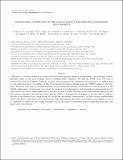Microlensing constraints on the mass of single stars from HST astrometric measurements
Abstract
We report on the first results from a large-scale observing campaign aiming to use astrometric microlensing to detect and place limits on the mass of single objects, including stellar remnants. We used the Hubble Space Telescope to monitor stars near the Galactic Center for 3 years, and we measured the brightness and positions of ∼2 million stars at each observing epoch. In addition to this, we monitored the same pointings using the VIMOS imager on the Very Large Telescope. The stars we monitored include several bright microlensing events observed from the ground by the OGLE collaboration. In this paper, we present the analysis of our photometric and astrometric measurements for 6 of these events, and derive mass constraints for the lens in each of these. Although these constraints are limited by the photometric precision of ground-based data, and our ability to determine the lens distance, we were able to constrain the size of the Einstein ring radius thanks to our precise astrometric measurements, the first routine measurements of this type from a large-scale observing program. This demonstrates the power of astrometric microlensing as a tool to constrain the masses of stars, stellar remnants, and, in the future, of extrasolar planets, using precise ground- and space-based observations.
Citation
Kains , N , Calamida , A , Sahu , K C , Casertano , S , Anderson , J , Udalski , A , Zoccali , M , Bond , H , Albrow , M , Bond , I , Brown , T , Dominik , M , Fryer , C , Livio , M , Mao , S & Rejkuba , M 2017 , ' Microlensing constraints on the mass of single stars from HST astrometric measurements ' , Astrophysical Journal , vol. 843 , no. 2 , 145 . https://doi.org/10.3847/1538-4357/aa78eb
Publication
Astrophysical Journal
Status
Peer reviewed
ISSN
0004-637XType
Journal article
Description
NK acknowledges support from HST grants GO- 12586, GO-13057, GO-13463 (PI: Sahu) and AR-14571 (PI: Kains). The OGLE project has received funding from the National Science Centre, Poland, grant MAESTRO 2014/14/A/ST9/00121 to AU. MZ acknowledges support by the Ministry of Economy, Development, and Tourism’s Millennium Science Initiative through grant IC120009, awarded to The Millennium Institute of Astrophysics (MAS), by Fondecyt Regular 1150345 and by the BASAL-CATA Center for Astrophysics and Associated Technologies PFB-06.Collections
Items in the St Andrews Research Repository are protected by copyright, with all rights reserved, unless otherwise indicated.

